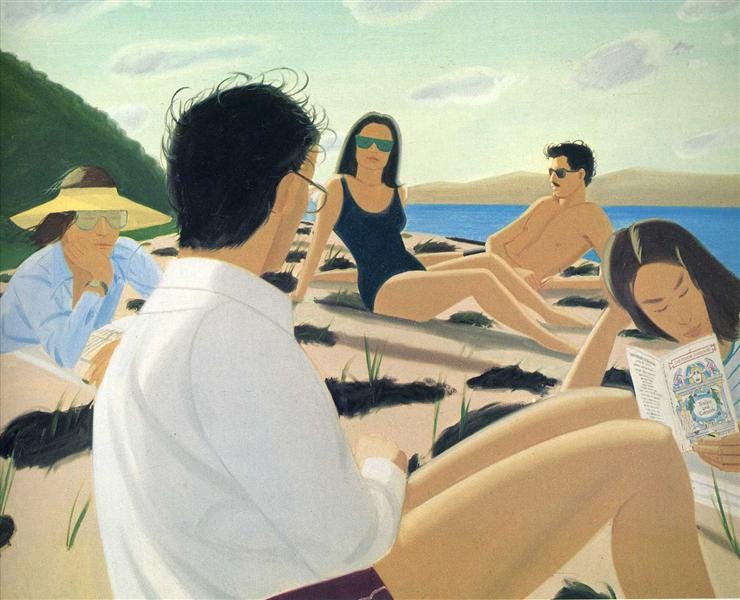sitcom
finding belonging in a friend group
I was waiting in line today at the Göreme Open Air Museum when I saw them. They looked like they had stepped out of the same Instagram influencer’s account: five women in their early-to-mid twenties, wearing fitted tank tops (white and black only) tucked into high-waisted, frayed blue jeans. Cross-body bags. Birkenstocks. Take them out of the remote, mountain terrain of Cappadocia and plop them into Soho, New York, and you wouldn’t bat an eye. You might not even notice them, so pervasive has that look become within a certain milieu. I wondered: were they friends because of their shared taste or had their tastes converged as a result of being friends?
Anytime I see a group in the wild, I try to guess what glue keeps them together. Have they been steadfast friends since college? Do they all play volleyball? A shared interest can be the springboard for friendship, but it’s not enough to keep a group together. You have to really like each other, but more than that, you have to enjoy hanging out collectively at least as much as you do one-on-one. Otherwise, there would be no group. For a group to form, there must be an awareness that “we are a thing” and intentional effort to keep everyone together. Shared narratives, origin stories, and insides jokes strengthen a group’s identity. Some drama keeps things exciting, but too much can cause dissolution.
In New York, my group of friends and I joke that we are a sitcom, the product of a writer’s room: three guys, three girls, racially diverse, single, living in the big city. The age difference between the oldest and youngest is 15 years. We’re writing the script to our story every time we hang out, and this meta play allows us to treat drama with levity. We don’t take ourselves too seriously. That was a sitcom moment, we say when something funny or unexpected or dramatic happens.
It’s rare to find a close group of friends post-college and being part of one feels really special. I have this desire to hold onto it and never let go. But I’m also aware that nothing is permanent. None of us are currently in committed, monogamous relationships, but that will certainly change. Some of us will get married, have kids, move away. There will be a day when we look back to the summer of 2023 and reminisce: that was a great season.
Despite wanting to find belonging in groups and communities, I’m also wary of them, especially if they revolve around an ideology or a way of life. I suspect it’s for this reason that I’ve never tried Soul Cycle or juice cleanses. When people ask me, “Are you part of X?” I usually respond, “I don’t know.” I resist labels. We like to put each other into buckets—you’re either in or you’re out—but people are so much more than whatever group they might identify with. You can simultaneously feel connection and disconnection in any group. If you’re true to yourself, you won’t always be perfectly aligned to the interests and ideology of your tribe. Some divergence is natural. If you are perfectly aligned, it’s possible you may have lost yourself within the greater identity of the group.
I don’t think I could ever be part of a group like the one I spotted in Göreme. As much as I envy the intense belonging I imagine those women must feel in each other’s company, I don’t know if I could subsume myself within any shared identity. I used to skim the surface of every group I was in, keenly aware of its container, and the ways in which I was different. Some call it writer’s syndrome. I call it self-preservation. Similar to being in a romantic relationship, I believe it’s important to cultivate your identity outside the group.
Seeing people do the very hard thing of juggling jobs, creative pursuits, friendships, dating, hobbies, I think, good for them. These are investments in different facets of your identity, which will make your sense of self stronger and your social connections more fulfilling as a result.
My sitcom friends have taught me something important: a special kind of bond forms when you click with someone despite your differences. I love this line in Gabor Maté’s The Myth of Normal:
Only entities distinct from each other can be connected.
When I think about what keeps my friend group together, it’s not because we dress the same or have similar tastes in music and movies. We don’t. By any legible marker of identity, we look nothing alike. We like each other because each person brings something unique to the party. We can laugh and joke, sympathize and commiserate, despite all the obvious ways we’re different. I don’t see us converging into a single identity ever. It’s like a jazz concert where everyone is playing a different instrument but riffing off the same tune. If we were all playing the saxophone, it wouldn’t be nearly as fun or interesting. It wouldn’t be a sitcom.
It’s been one year since I started this Substack, and I want to thank you for reading my reflections and supporting me. If you enjoy my writing, please share it with a friend!



I loved this, and it resonates a lot! Thank you for posting :) 🌻
Intriguing analysis. I do think its a duty of a writer to stuck out a little bit - we need our space to think and create